Hanlin Gu
WeBank, China
Order-Level Attention Similarity Across Language Models: A Latent Commonality
Nov 07, 2025



Abstract:In this paper, we explore an important yet previously neglected question: Do context aggregation patterns across Language Models (LMs) share commonalities? While some works have investigated context aggregation or attention weights in LMs, they typically focus on individual models or attention heads, lacking a systematic analysis across multiple LMs to explore their commonalities. In contrast, we focus on the commonalities among LMs, which can deepen our understanding of LMs and even facilitate cross-model knowledge transfer. In this work, we introduce the Order-Level Attention (OLA) derived from the order-wise decomposition of Attention Rollout and reveal that the OLA at the same order across LMs exhibits significant similarities. Furthermore, we discover an implicit mapping between OLA and syntactic knowledge. Based on these two findings, we propose the Transferable OLA Adapter (TOA), a training-free cross-LM adapter transfer method. Specifically, we treat the OLA as a unified syntactic feature representation and train an adapter that takes OLA as input. Due to the similarities in OLA across LMs, the adapter generalizes to unseen LMs without requiring any parameter updates. Extensive experiments demonstrate that TOA's cross-LM generalization effectively enhances the performance of unseen LMs. Code is available at https://github.com/jinglin-liang/OLAS.
ErrorEraser: Unlearning Data Bias for Improved Continual Learning
Jun 11, 2025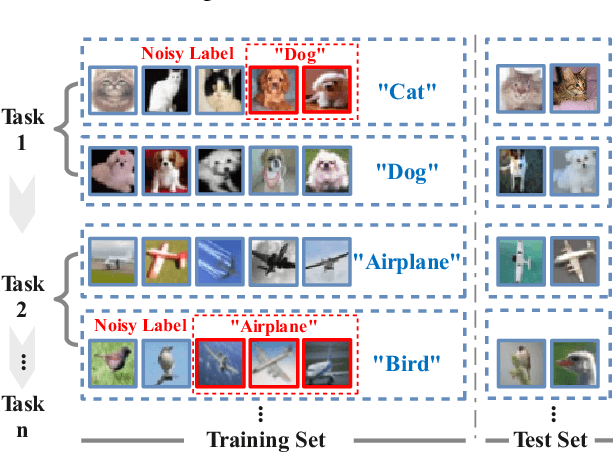
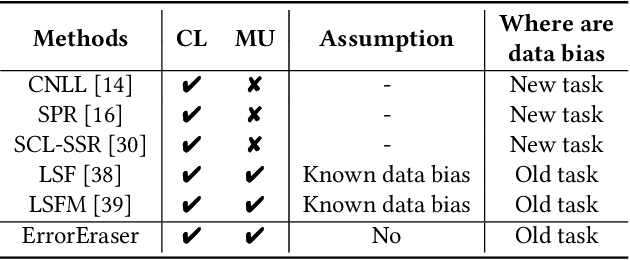
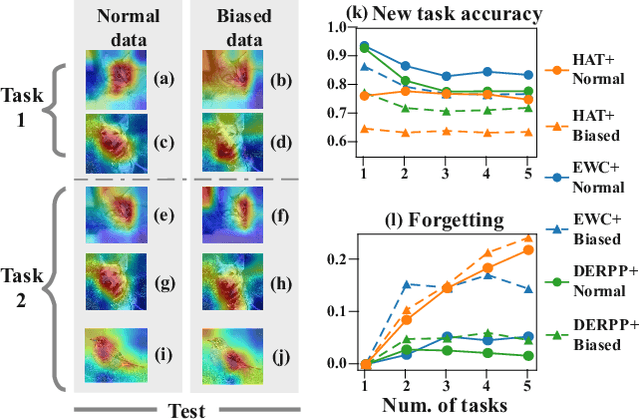
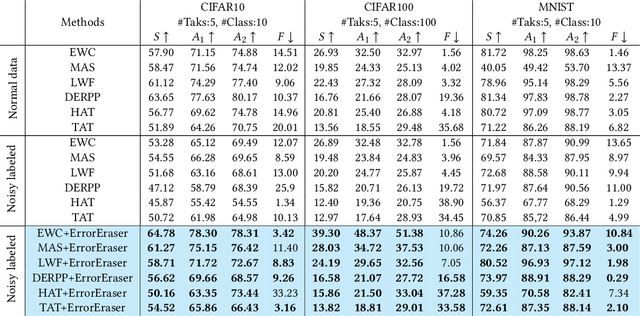
Abstract:Continual Learning (CL) primarily aims to retain knowledge to prevent catastrophic forgetting and transfer knowledge to facilitate learning new tasks. Unlike traditional methods, we propose a novel perspective: CL not only needs to prevent forgetting, but also requires intentional forgetting.This arises from existing CL methods ignoring biases in real-world data, leading the model to learn spurious correlations that transfer and amplify across tasks. From feature extraction and prediction results, we find that data biases simultaneously reduce CL's ability to retain and transfer knowledge. To address this, we propose ErrorEraser, a universal plugin that removes erroneous memories caused by biases in CL, enhancing performance in both new and old tasks. ErrorEraser consists of two modules: Error Identification and Error Erasure. The former learns the probability density distribution of task data in the feature space without prior knowledge, enabling accurate identification of potentially biased samples. The latter ensures only erroneous knowledge is erased by shifting the decision space of representative outlier samples. Additionally, an incremental feature distribution learning strategy is designed to reduce the resource overhead during error identification in downstream tasks. Extensive experimental results show that ErrorEraser significantly mitigates the negative impact of data biases, achieving higher accuracy and lower forgetting rates across three types of CL methods. The code is available at https://github.com/diadai/ErrorEraser.
Addressing Spatial-Temporal Data Heterogeneity in Federated Continual Learning via Tail Anchor
Dec 24, 2024
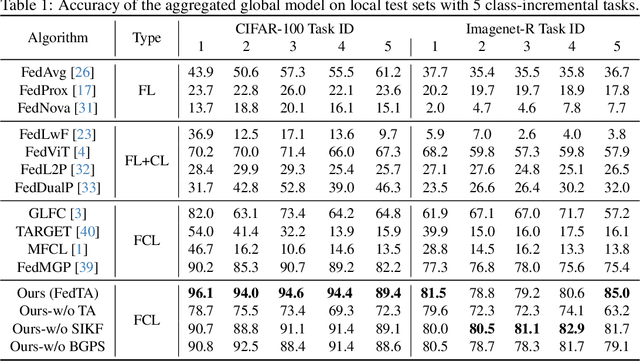
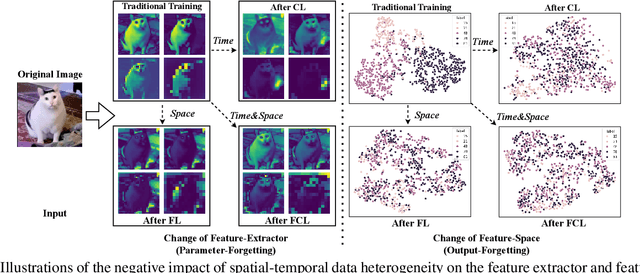
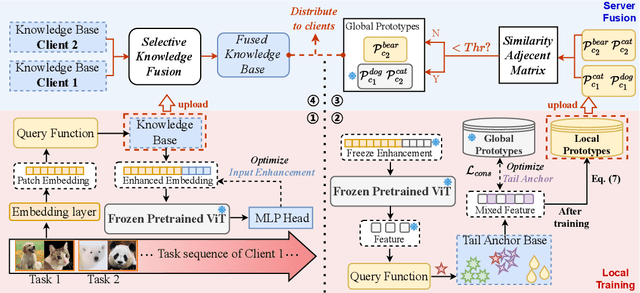
Abstract:Federated continual learning (FCL) allows each client to continually update its knowledge from task streams, enhancing the applicability of federated learning in real-world scenarios. However, FCL needs to address not only spatial data heterogeneity between clients but also temporal data heterogeneity between tasks. In this paper, empirical experiments demonstrate that such input-level heterogeneity significantly affects the model's internal parameters and outputs, leading to severe spatial-temporal catastrophic forgetting of local and previous knowledge. To this end, we propose Federated Tail Anchor (FedTA) to mix trainable Tail Anchor with the frozen output features to adjust their position in the feature space, thereby overcoming parameter-forgetting and output-forgetting. Moreover, three novel components are also included in FedTA: Input Enhancement for improving the performance of pre-trained models on downstream tasks; Selective Input Knowledge Fusion for fusion of heterogeneous local knowledge on the server side; and Best Global Prototype Selection for finding the best anchor point for each class in the feature space. Extensive experiments demonstrate that FedTA not only outperforms existing FCL methods but also effectively preserves the relative positions of features, remaining unaffected by spatial and temporal changes.
Disentangling data distribution for Federated Learning
Oct 16, 2024Abstract:Federated Learning (FL) facilitates collaborative training of a global model whose performance is boosted by private data owned by distributed clients, without compromising data privacy. Yet the wide applicability of FL is hindered by entanglement of data distributions across different clients. This paper demonstrates for the first time that by disentangling data distributions FL can in principle achieve efficiencies comparable to those of distributed systems, requiring only one round of communication. To this end, we propose a novel FedDistr algorithm, which employs stable diffusion models to decouple and recover data distributions. Empirical results on the CIFAR100 and DomainNet datasets show that FedDistr significantly enhances model utility and efficiency in both disentangled and near-disentangled scenarios while ensuring privacy, outperforming traditional federated learning methods.
A few-shot Label Unlearning in Vertical Federated Learning
Oct 14, 2024



Abstract:This paper addresses the critical challenge of unlearning in Vertical Federated Learning (VFL), an area that has received limited attention compared to horizontal federated learning. We introduce the first approach specifically designed to tackle label unlearning in VFL, focusing on scenarios where the active party aims to mitigate the risk of label leakage. Our method leverages a limited amount of labeled data, utilizing manifold mixup to augment the forward embedding of insufficient data, followed by gradient ascent on the augmented embeddings to erase label information from the models. This combination of augmentation and gradient ascent enables high unlearning effectiveness while maintaining efficiency, completing the unlearning procedure within seconds. Extensive experiments conducted on diverse datasets, including MNIST, CIFAR10, CIFAR100, and ModelNet, validate the efficacy and scalability of our approach. This work represents a significant advancement in federated learning, addressing the unique challenges of unlearning in VFL while preserving both privacy and computational efficiency.
Diffusion-Driven Data Replay: A Novel Approach to Combat Forgetting in Federated Class Continual Learning
Sep 04, 2024Abstract:Federated Class Continual Learning (FCCL) merges the challenges of distributed client learning with the need for seamless adaptation to new classes without forgetting old ones. The key challenge in FCCL is catastrophic forgetting, an issue that has been explored to some extent in Continual Learning (CL). However, due to privacy preservation requirements, some conventional methods, such as experience replay, are not directly applicable to FCCL. Existing FCCL methods mitigate forgetting by generating historical data through federated training of GANs or data-free knowledge distillation. However, these approaches often suffer from unstable training of generators or low-quality generated data, limiting their guidance for the model. To address this challenge, we propose a novel method of data replay based on diffusion models. Instead of training a diffusion model, we employ a pre-trained conditional diffusion model to reverse-engineer each class, searching the corresponding input conditions for each class within the model's input space, significantly reducing computational resources and time consumption while ensuring effective generation. Furthermore, we enhance the classifier's domain generalization ability on generated and real data through contrastive learning, indirectly improving the representational capability of generated data for real data. Comprehensive experiments demonstrate that our method significantly outperforms existing baselines. Code is available at https://github.com/jinglin-liang/DDDR.
PDSS: A Privacy-Preserving Framework for Step-by-Step Distillation of Large Language Models
Jun 18, 2024



Abstract:In the context of real-world applications, leveraging large language models (LLMs) for domain-specific tasks often faces two major challenges: domain-specific knowledge privacy and constrained resources. To address these issues, we propose PDSS, a privacy-preserving framework for step-by-step distillation of LLMs. PDSS works on a server-client architecture, wherein client transmits perturbed prompts to the server's LLM for rationale generation. The generated rationales are then decoded by the client and used to enrich the training of task-specific small language model(SLM) within a multi-task learning paradigm. PDSS introduces two privacy protection strategies: the Exponential Mechanism Strategy and the Encoder-Decoder Strategy, balancing prompt privacy and rationale usability. Experiments demonstrate the effectiveness of PDSS in various text generation tasks, enabling the training of task-specific SLM with enhanced performance while prioritizing data privacy protection.
FedMKT: Federated Mutual Knowledge Transfer for Large and Small Language Models
Jun 04, 2024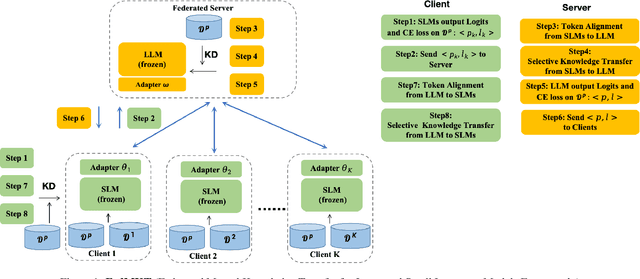


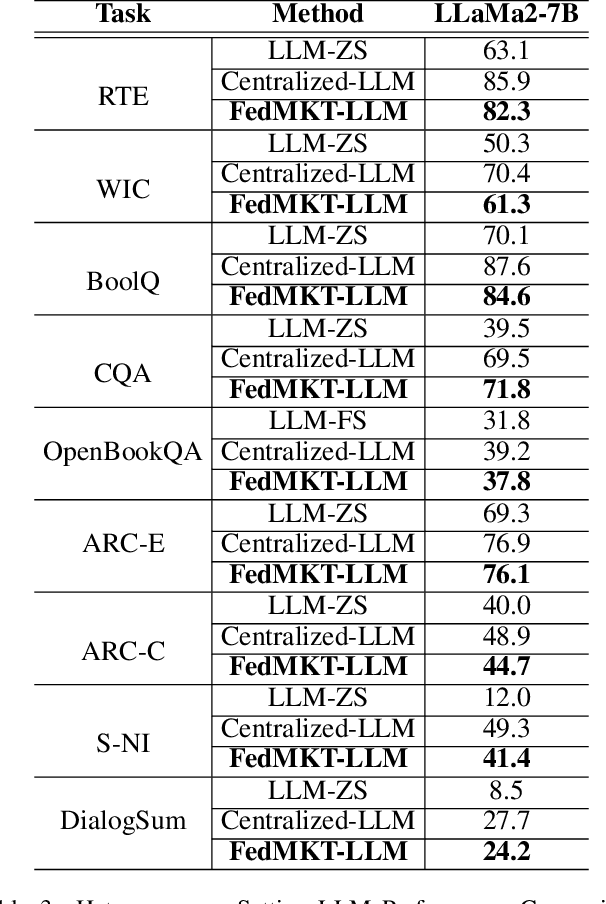
Abstract:Recent research in federated large language models (LLMs) has primarily focused on enabling clients to fine-tune their locally deployed homogeneous LLMs collaboratively or on transferring knowledge from server-based LLMs to small language models (SLMs) at downstream clients. However, a significant gap remains in the simultaneous mutual enhancement of both the server's LLM and clients' SLMs. To bridge this gap, we propose FedMKT, a parameter-efficient federated mutual knowledge transfer framework for large and small language models. This framework is designed to adaptively transfer knowledge from the server's LLM to clients' SLMs while concurrently enriching the LLM with clients' unique domain insights. We facilitate token alignment using minimum edit distance (MinED) and then selective mutual knowledge transfer between client-side SLMs and a server-side LLM, aiming to collectively enhance their performance. Through extensive experiments across three distinct scenarios, heterogeneous, homogeneous, and one-to-one, we evaluate the effectiveness of FedMKT using various public LLMs and SLMs on a range of NLP text generation tasks. Empirical results demonstrate significant performance improvements in clients' SLMs with the aid of the LLM. Furthermore, the LLM optimized by FedMKT achieves a performance comparable to that achieved through direct fine-tuning based on clients' data, highlighting the effectiveness and adaptability of FedMKT.
FedAdOb: Privacy-Preserving Federated Deep Learning with Adaptive Obfuscation
Jun 03, 2024Abstract:Federated learning (FL) has emerged as a collaborative approach that allows multiple clients to jointly learn a machine learning model without sharing their private data. The concern about privacy leakage, albeit demonstrated under specific conditions, has triggered numerous follow-up research in designing powerful attacking methods and effective defending mechanisms aiming to thwart these attacking methods. Nevertheless, privacy-preserving mechanisms employed in these defending methods invariably lead to compromised model performances due to a fixed obfuscation applied to private data or gradients. In this article, we, therefore, propose a novel adaptive obfuscation mechanism, coined FedAdOb, to protect private data without yielding original model performances. Technically, FedAdOb utilizes passport-based adaptive obfuscation to ensure data privacy in both horizontal and vertical federated learning settings. The privacy-preserving capabilities of FedAdOb, specifically with regard to private features and labels, are theoretically proven through Theorems 1 and 2. Furthermore, extensive experimental evaluations conducted on various datasets and network architectures demonstrate the effectiveness of FedAdOb by manifesting its superior trade-off between privacy preservation and model performance, surpassing existing methods.
Ferrari: Federated Feature Unlearning via Optimizing Feature Sensitivity
May 29, 2024Abstract:The advent of Federated Learning (FL) highlights the practical necessity for the 'right to be forgotten' for all clients, allowing them to request data deletion from the machine learning model's service provider. This necessity has spurred a growing demand for Federated Unlearning (FU). Feature unlearning has gained considerable attention due to its applications in unlearning sensitive features, backdoor features, and bias features. Existing methods employ the influence function to achieve feature unlearning, which is impractical for FL as it necessitates the participation of other clients in the unlearning process. Furthermore, current research lacks an evaluation of the effectiveness of feature unlearning. To address these limitations, we define feature sensitivity in the evaluation of feature unlearning according to Lipschitz continuity. This metric characterizes the rate of change or sensitivity of the model output to perturbations in the input feature. We then propose an effective federated feature unlearning framework called Ferrari, which minimizes feature sensitivity. Extensive experimental results and theoretical analysis demonstrate the effectiveness of Ferrari across various feature unlearning scenarios, including sensitive, backdoor, and biased features.
 Add to Chrome
Add to Chrome Add to Firefox
Add to Firefox Add to Edge
Add to Edge